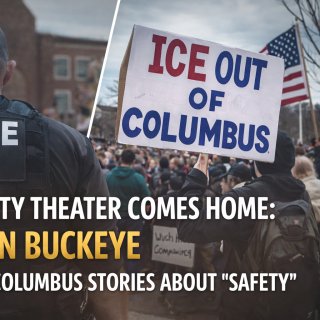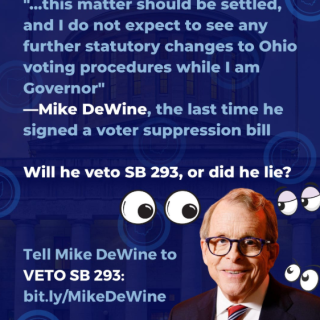Advertisement
Are you reading the Free Press online while "sheltering in place?" It's astonishing how fast life changed. Governor DeWine listened to the science of epidemiology and to Ohio Public Health director, Amy Acton, now a local shero for her knowledge and empathy. Instantly, the 24 hour news cycle was gifted with a hydra-headed crisis and a mission to tell the stories and their impacts on our elections, the economy, health care, self care, poverty, food access, energy use - our way of life, really, here, in other states, and in countries around the world.
Business as Usual: Interrupted! A virus, smaller than a bacteria, invisible without an electron microscope, whose relatives cause the common cold and influenza, is so contagious that a global pandemic now threatens our way of life. Perhaps only for a matter of months if we are able to flatten the rising curve of infections, but the aftermath is hard to predict. As Yogi Berra put it, "It's tough to make predictions, especially about the future."
It's clear that the future is in play. The President's advisors, even some Fox News commentators, have had to bow to scientists toiling in the deep state of Public Health (the ones who weren't banished in 2018 when the White House eliminated its own pandemic response team). Given the dire economic consequences of the pandemic, a wide array of policies and bipartisan legislation is being rolled out - direct payments to workers and small businesses advocated by Democrats, and bailouts to multinational corporations advocated by Republicans to support the Oil and Gas Industries, the Airlines, Cruise Ships, et al. Hmmm... yes, the future is in play - will it give us a taste of Andrew Yang's $1000 per month Freedom Dividend? Or will our "breaking bad" addiction to the status quo predominate?
COVID-19 is already a tragedy for many whose lives have been lost. But as our New Age friends like to observe, when one door closes another one opens, and this is profoundly true of this crisis. As I listened to DeWine and Acton talk about the life and death consequences if we don't act now, how our hospitals could be overwhelmed, how everyone must be involved, how we are all in this together - I kept imagining "What if they were talking about Climate Change?"
There are so many parallels: 1) the invisible threat of the virus, and the invisible threat of CO2 and greenhouse gases; 2) the global nature of both crises; 3) the dire consequences of NOT responding to both crises; 4) the need to inform the public about lifestyle changes in order to address both crises; and 5) the financial and economic implications for political leaders and policymakers.
Pun intended, the Coronavirus Crisis has trumped the Climate Crisis. If leaders act on the science, change happens. The Coronavirus (CV) crisis has demonstrated that if the media inform the public, our behavior can change, and, in fact, has changed. The good news is that the Coronavirus breaks open and reveals the cracks in Business as Usual, giving us the opportunity to use the CV crisis to leverage the benefits of the progressive agenda in addressing climate change. Here are some examples and lessons learned that we can exploit in the coming months to influence the November elections.
1) Health Care. A single payer system could address the millions of uninsured and underinsured citizens, solving the cumbersome maze of hoops required to eliminate co-pays, deductibles, and hospital stays during the crisis. The spread of infections would be curtailed significantly. Further, our current privatized health care system limits the number of beds and intensive care units to maximize efficiency and profits. This approach often results in the closure of less efficient and cost-effective hospitals and emergency care centers in smaller cities and rural communities that could otherwise offer frontline defense against infectious diseases. Efforts to utilize our VA hospitals, the national guard, and even naval vessels would not be necessary if we could simply expand services in a single payer system.
2) Income Inequality. When health care is privatized and required to earn profits for providers - doctors, hospitals, insurance companies - a bias in this system virtually guarantees that there will be winners and losers based on income and employment. The CV crisis exposes the need to treat and test everyone, regardless of income. In reality, tens of millions of Americans live in poverty and two million of us are homeless and unable to "shelter in place."
Similarly, the crisis in affordable housing plagues every city in the U.S. because profit driven developers cannot earn sufficient profits from low income renters and home buyers. Government investment is required to ensure quality housing for every citizen.
Corporations understand that their largest expense is personnel costs. In order to maximize profits they have generally opposed labor unions, raising the minimum wage, favor hiring low cost immigrant labor, and the deployment of new technologies to eliminate repetitive jobs. The result of these policies is income inequality on a scale today that threatens efforts to overcome the CV crisis, as well as goals to transition away from fossil fuels and achieve climate justice for low income communities.
The progressive agenda now comes into play with shovel ready solutions to address income inequality - raise the minimum wage, raise taxes on high income individuals, invest in government programs to build affordable housing, hire union workers, etc. These are all popular programs supported by 60-80% of Americans regardless of political preference. This agenda will put new pressure on government leaders to address income inequality in order to overcome the CV crisis, and ultimately, the climate crisis.
3) The Global Economy. The CV crisis has forced us to look at global supply chains, and the vulnerability created when equipment, even a single part, can limit our ability to produce and deliver respirators, masks, drugs, etc. from other countries. We are relearning the value of producing goods and services locally, and creatively; for example, using 3D printing to manufacture needed parts.
As the global economy falters and stock exchanges tank in the CV crisis, it shines a light on the unsustainable forces that are the underlying cause of climate change: 1) cheap, subsidized fossil fuels producing and distributing commodity food, goods, and services around the world, and 2) the demand for continual economic growth to repay investors and meet quarterly profit goals to satisfy shareholders. The Rocky Mountain Institute calculates that the average amount of CO2 embedded in the products we purchase is estimated to be 42% (11% from transportation).
Neoliberal economists promote this unsustainable economic growth by ignoring the cost of "externalities" in the form of deteriorating ecosystems (depleted nutrients in soil, air pollution, contaminated water) and the exploitation of labor in countries with little or no protections. Further, the elimination of tariffs and the creation of so called Free Trade agreements have been established to favor corporate and financial interests if challenged by government efforts to limit or regulate corporate practices.
The global CV crisis is a powerful reminder that science-based, government actions are essential to prioritize the interests of the public over private, profit-driven corporate interests. Similarly, government intervention is essential to avoid the headlong, private sector rush to maintain a system that climate scientists predict will lead to catastrophic disruption of the climate.
4) Localization. The Coronavirus is global, but its impact is local. The challenge is to respond as a community, to protect yourself because each one of us can potentially infect our friends and family. Preppers will prep, stocking up on food and guns, but the healthy response to the crisis is to look out for each other, and reach out to our neighbors even while staying close to home. We are all encouraged to support our local businesses during the crisis by purchasing gift cards, ordering takeout, and tipping generously. We understand intuitively that the real economy, the job creators, are local.
The antidote to the unsustainable, global consumer economy turns out to be localization, a "solution multiplier," according to Helena Norberg Hodge, author and producer of the award winning film, Economics of Happiness. When we invest in our local communities by shopping at family owned businesses, eating at locally owned restaurants, banking at credit unions and community banks, saving our family farms, establishing farmers markets, we keep more of our dollars circulating locally and available for public services, health care, education, parks, libraries, and a better quality of life. The more we localize, we "shrink" the distances involved in producing and shipping food and goods around the world, thereby reducing the need for fossil fuels, pesticides, packaging, marketing, etc. Local businesses are more accountable to customers in their community and are more likely to support charities and nonprofit services that benefit everyone.
Every choice we make to support local businesses, we take a bite out of the global economy that extracts value from local communities, even whole countries, without any loyalty to communities where they are located, and little concern for the environmental consequences of their actions. The CV crisis reinforces the need to focus on strengthening and revitalizing our neighborhoods and communities by prioritizing the interests of the public over private sector profits.
New eco-friendly economic models are emerging to challenge the neoliberal economics of the status quo. Think sharing economy, cooperative and employee owned businesses, social enterprises, and even ecological and degrowth economic models. New fiscal and monetary policies are emerging as well. The public banking movement offers the opportunity for states and municipalities to take control of their own credit and invest in areas that have been neglected by private banks: affordable housing, renewable energy, green infrastructure projects, etc. Modern Monetary Theory and the MMT economists propose to nationalize the Federal Reserve in order to focus on the needs of local communities - not by creating federal programs, but by funding local governments and nonprofits who are best positioned to design programs to meet community needs.
5) Green New Deal. By analyzing the COVID-19 crisis through the lens of the progressive agenda, we begin to see how the radical disruption of the present social and economic status quo can be leveraged to address the restructuring required to move us away from the global consumer economy, which David Korten calls the Suicide Economy, and toward a relocalization and revitalization of our local food, retail, and manufacturing economies to serve people, planet, and profit that is reinvested locally.
As Naomi Klein's Shock Doctrine reminds us, when such game changing, paradigm-shifting decisions are in play, corporate interests will intervene to solve the crisis by privatization and their tired mantra that more economic growth is the fix needed to boost the economy, bring in new jobs, etc. They hold most of the cards today, but progressives have a new vision, a Green New Deal, that connects all the dots described above and has inspired the Sunrise Movement of America's Youth and a smart and growing faction of the Democratic Party.
The Green New Deal offers a positive, comprehensive vision of the future - a framework that has been lacking in past worthy, single issue campaigns that too often divided our energies. The Green New Deal proposes to invest in the transition to renewable energy, but goes much further by creating a Jobs Guarantee program that will ensure a Just Transition for displaced workers. Medicare for All promises to finally establish health care as a human right, free industry and small businesses from the burden of providing health care insurance, and free workers to move to other jobs or start a new business without losing their health care.
Free pre-K education and tuition free postsecondary education plus the forgiveness of student loan debts will offer every citizen a more level playing field to participate in 21st century society. A Homes Guarantee program to ensure high quality, affordable housing complements this suite of programs that build on the vision of FDR's New Deal, LBJ's Great Society, and JFK's New Frontier.
How will we pay for these programs? The CV crisis has exposed the reality that "taxpayer dollars" are a red herring. As I write this, Treasury Secretary Steve Mnuchin is discussing 1-2 or perhaps more trillions of dollars to rescue an economy that threatens Trump's reelection. No one is worried about paying for it because the Federal government issues the currency and can spend dollars into the economy so long as the money is used to support productive work, projects, and businesses that meet the needs of society.
In reality, the Green New Deal (GND) programs have been designed by the MMT economists and whether in 2020 or 2024 one of them, Stephanie Kelton perhaps (Sanders Institute fellow and advisor to Bernie's campaign), will become Secretary of the Treasury and direct the Federal Reserve to fund GND programs. The Public Banking movement can also play a part in directing strategic public investments at the state and city/regional levels.
The GND movement and vision is growing and spreading. Let's use the current crisis to demonstrate how the progressive agenda can move us forward, away from Shock Doctrine privatization toward public responsibility. We may not snatch Democracy from the Oligarchs this year, but we aren't going away until we do.



